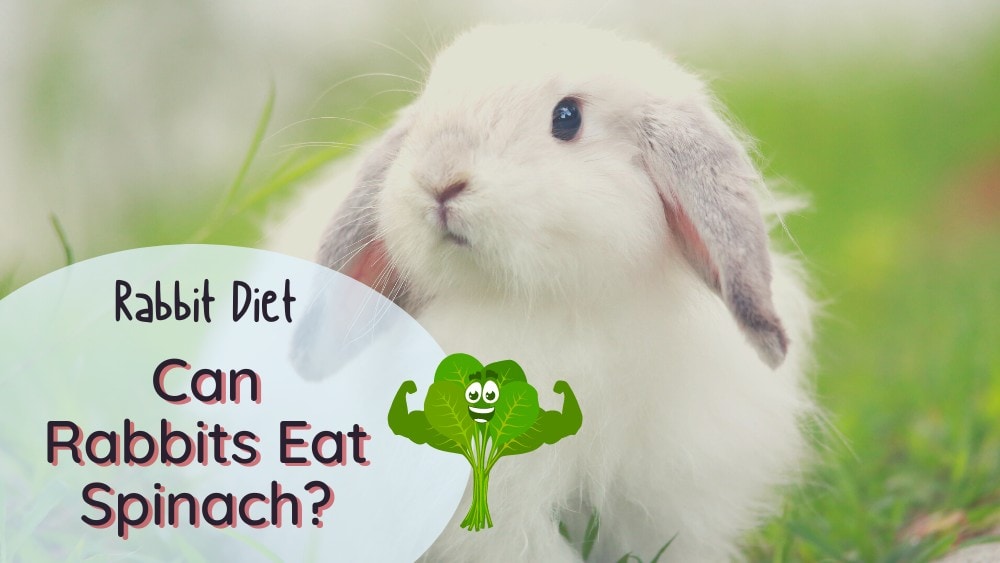If something is green, bunnies can eat it, right?
Well, unfortunately, it’s not that simple.
A rabbit should eat almost exclusively green plants, like crisp, freshly-dried green hay paired with veggies like kale, cilantro, and bell peppers.
But that doesn’t mean all greens are good for bunnies. Spinach is one of those veggies with some benefits and some drawbacks. Here, we’ll weigh the nutritional benefits and risks of feeding spinach to rabbits,
Can Rabbits Eat Spinach?
A leaf or two of spinach won’t hurt your rabbit. Spinach is not poisonous for bunnies. However, rabbits shouldn’t eat spinach or related greens – like chard or beet tops – as part of their regular diet. These are all high in oxalic acid, which can lead to kidney and bladder problems in rabbits.
Can Rabbits Eat Spinach?
A leaf or two of spinach won’t hurt your rabbit. Spinach is not poisonous for bunnies. However, rabbits shouldn’t eat spinach or related greens – like chard or beet tops – as part of their regular diet. These are all high in oxalic acid, which can lead to kidney and bladder problems in rabbits.
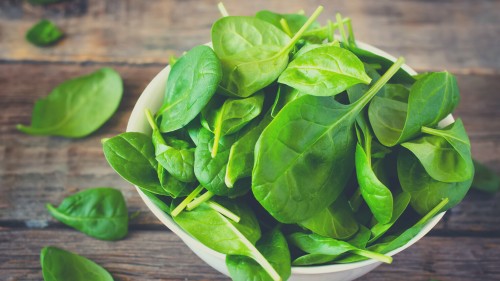
What is Spinach?
What is spinach? For those of us living in the United States, this may seem like a simple question. Spinach – the dark green leafy stuff sold in $5 clamshells at every supermarket. It leaves a funny feeling in your mouth when eaten raw and gets slimy when it’s cooked. Popeye ate it canned. You know, spinach.
In this article, we’re focusing on common spinach (Spinacia oleracea) – the salad green described above. It’s a member of the amaranth family and is related to quinoa, orach (red spinach), beetroot, and chard (also known as silverbeet).
However, there are several green leafy vegetables referred to as “spinach” in various parts of the world. These are all different species and have different nutritional content.
Some of the other leafy greens that have “spinach” in their popular names are safe for rabbits and others are not. Here are some examples.
- Water Spinach (Ipomoea aquatica) or “Ong Choy” – Safe and healthy for rabbits. See this study by the Center for Livestock and Agriculture Development in Cambodia.
- New Zeland Spinach (Tetragonia tetragonioides) – High oxalate, not safe for rabbits.
- Malabar Spinach (Basella alba) – High oxalate, not safe for rabbits.
- Tree Spinach (Cnidoscolus aconitifolius) or “Chaya” – Toxic to some animals if not prepared properly. Use caution.
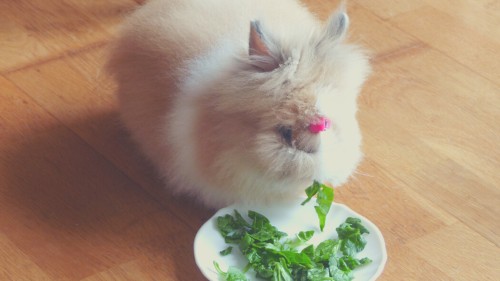
Nutritional Benefits of Spinach
So let’s get back to talking about common spinach (Spinacia oleracea). The deep green color of common spinach reveals that it’s full of vitamins and other nutrients.
It’s a significant source of vitamin A, vitamin K1, and minerals like iron and folate.
Vitamin K is known for facilitating blood clotting, but it has many other physiological functions. One study used spinach juice as a supplement for helping a rabbit recover from a sciatic nerve injury and hypothesized that the vitamin K in the spinach drove the progress.
Spinach is 2.2% fiber – so spinach has a moderate fiber content compared to other vegetables. But rabbits thrive on a diet that’s around 20% fiber! So while spinach is a good fiber source for humans, it doesn’t meet a rabbit’s extraordinary demand for roughage.
Spinach is low in starch and sugar, which is good for bunnies. Spinach won’t make your rabbit overweight or cause tooth decay.
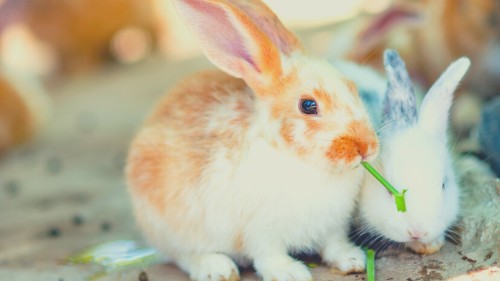
Risks of Feeding Spinach to Bunnies
The biggest concern with spinach is its oxalate content. Spinach – and its relatives, Swiss chard, beet leaves and orach – are all high in oxalic acid. Oxalic acid is called an anti-nutrient, because it binds minerals, making them harder for the body to use.
With high amounts of oxalic acid in the diet, minerals like calcium are more likely to crystalize and cause kidney stones or bladder sludge.
Since urinary tract problems are among the most common health issues in rabbits, bunnies need to stick to greens that are low in oxalates.
Let’s look at the most common risks of feeding large amounts of spinach, beet greens, or chard to rabbits.
Kidney Stones and Bladder Sludge
Ew, kidney stones and bladder sludge sound nasty, don’t they? I cared for a sweet Polish rabbit once who developed kidney stones, and she was not happy about it! (And she got this condition even without eating spinach!)
If you’ve ever noticed a milky-colored gritty substance in your rabbit’s litter pan or drop tray, that’s called bladder sludge. Rabbits tend to excrete large amounts of calcium oxalate in their urine, creating this murky sludge.
Foods high in oxalic acid or calcium can make it worse – and spinach contains large amounts of both oxalic acid and calcium!
Since the body converts vitamin C to oxalate before excreting it in urine, foods high in vitamin C can contribute to urinary sludge or stones as well, especially if paired with high-oxalate food. Spinach – as well as many other fruits and vegetables that are good for bunnies – is high in vitamin C.
Skin and Mouth Irritation
People describe it in different ways, but most people experience a gritty, tannic, bitter, or metallic sensation when eating raw spinach. This is – you guessed it – caused by oxalic acid.
Most bunnies don’t seem bothered by it, but the acid could irritate some rabbits’ lips, gums, or mouth tissue. If you do give your rabbit spinach, let it try just a single bite to start with and see how it reacts.
What Greens Can Rabbits Not Eat?
For reference, here’s a useful list of greens that rabbits should not eat regularly. The vegetables on this list either have moderate-to-high oxalic acid content or contain other chemical compounds that can affect them negatively. These greens are not poisonous for rabbits in small quantities, but shouldn’t be given frequently.
- Spinach
- Beet Greens
- Chard (Swiss chart, rainbow chard, silverbeet)
- Orach
- Parsley
- Mustard greens
- Collard greens
- Iceberg lettuce.
Leafy Greens that Rabbits Should NEVER Eat
Warning! There are a number of leafy green plants that are toxic to rabbits even in small amounts. Never give your rabbit the following leafy greens:
- Rhubarb (toxic!)
- Potato Leaves
- Tomato Leaves
- Houseplants
Make sure to read our comprehensive list of harmful foods for rabbits for more information.
What Are the Best Leafy Greens for Rabbits?
So, if spinach isn’t a good choice, what does a healthy rabbit salad contain? Good leafy greens for rabbits include those that are low in oxalate, high in fiber, and rich in vitamins. Here’s a list of good leafy greens for rabbits:
- Romaine lettuce
- Arugula
- Dandelion greens (from a pesticide-free source)
- Cilantro
- Basil
- Mint
- Carrot tops (in moderation)
- Wheatgrass
- Bok choy
- Kale (in moderation)
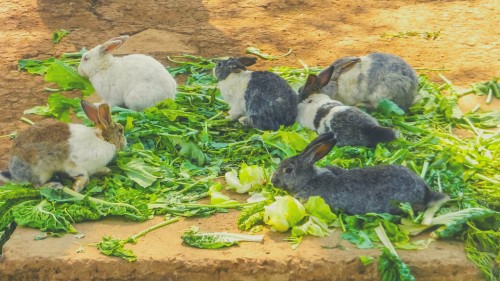
How to Feed Spinach to Rabbits
If you would like to give your rabbit some spinach – perhaps because of its nutritional value or because it’s the only green you have in the fridge at the moment – you can, if you follow these guidelines.
- Use good spinach. It should be fresh, from a low-pesticide source, and not at all wilted or slimy. If greens look too old to add to your own salad, they aren’t appropriate for rabbits either. A 2008 study from the American Society of Horticultural Science found that spinach picked in the fall has the lowest oxalate content.
- Feed it fresh, not cooked. Steaming spinach does reduce its oxalate content little bit, but your rabbit probably won’t touch cooked spinach! Offer it plainly, without any dressing.
- Give your bunny just a couple of leaves and watch for a reaction for 24 hours. Do not introduce any other new foods.
- Give your bunny a small handful of spinach leaves once a week, not paired with other high oxalate foods.
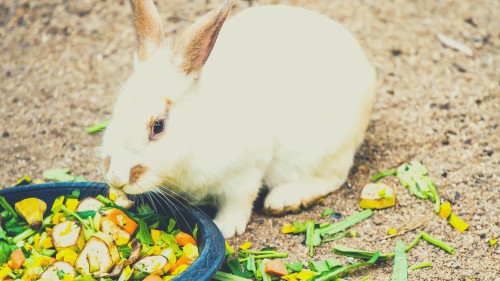
Conclusion
I was chatting with a friend recently about feeding bunnies, and she – not being a rabbit owner – said, “I’d give spinach to rabbits without a second thought.” Many people don’t realize that not all leafy green vegetables are safe for rabbits to chow down on.
Make sure to educate your family or roommates about what foods your bunny can and can’t eat. Warn them not to feed your rabbit high-oxalate greens like spinach, beet greens, or chard – especially not without letting you know.
If you choose to let your bunny have some of these veggies, control the amounts carefully. Watch your rabbit’s cage or litter box for the milky presence of bladder sludge. If you suspect kidney or urinary tract problems, stop feeding any high-oxalate foods and call your veterinarian for advice.
Did you realize that meal planning for a rabbit can be so complicated? Read all about a bunny’s unique nutritional needs in our complete guide to feeding pet rabbits.


